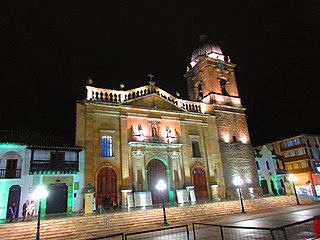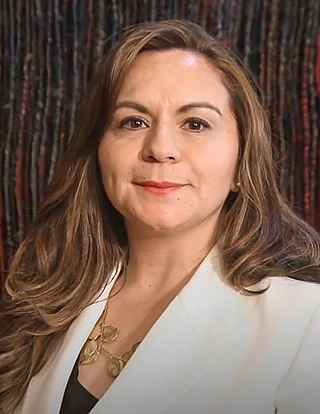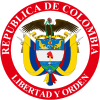Telecommunications in Mongolia face unique challenges. As the least densely populated country in the world,with a significant portion of the population living a nomadic lifestyle,it has been difficult for many traditional information and communication technology (ICT) companies to make headway into Mongolian society. With almost half the population clustered in the capital of Ulaanbaatar,most landline technologies are deployed there. Wireless technologies have had greater success in rural areas.

The National Telecommunications and Information Administration (NTIA) is a bureau of the United States Department of Commerce that serves as the president's principal adviser on telecommunications policies pertaining to the United States' economic and technological advancement and to regulation of the telecommunications industry.

Tunja is a municipality and city on the Eastern Ranges of the Colombian Andes,in the region known as the Altiplano Cundiboyacense,130 km northeast of Bogotá. In 2018 the municipality had a population of 172,548. It is the capital of Boyacádepartment and the Central BoyacáProvince. Tunja is an important educational centre of well-known universities. In the time before the Spanish conquest of the Muisca,there was an indigenous settlement,called Hunza,seat of the hoa Eucaneme,conquered by the Spanish conquistadors on August 20,1537. The Spanish city was founded by captain Gonzalo Suárez Rendón on August 6,1539,exactly one year after the capital Santaféde Bogotá. The city hosts the most remaining Muisca architecture:Hunzahúa Well,Goranchacha Temple and Cojines del Zaque.

Tarek Kamel was an Egyptian politician and computer engineer expert in global Internet governance issues.

The Malaysian Communications and Multimedia Commission is a regulatory body whose key role is the regulation of the communications and multimedia industry based on the Malaysian Communications and Multimedia Commission Act 1998,the Communications and Multimedia Act 1998,and the Strategic Trade Act 2010. MCMC is similar to the National Telecommunications Commission (NTC) in the Philippines. Its role to implement and promote the Government's national policy objectives for the communications and multimedia sector.
The Internet in Zimbabwe has seen rapid expansion in recent years. The Internet country code top-level domain is .zw. In 2009,the Mugabe-Tsvangirai Government of National Unity established a Ministry of Information and Communications Technology to focus on ICT growth and development.

Internet in Afghanistan is available in all of its 34 provinces,and is used by over 9 million people as of 2022. The internet officially became available in 2002 during the presidency of Hamid Karzai. Prior to that year,it was prohibited because the Islamic Emirate of Afghanistan believed that it may be used to broadcast obscene,immoral and anti-Islamic material,and because the few internet users at the time could not be easily monitored as they obtained their telephone lines from neighboring Pakistan.

The Family Online Safety Institute (FOSI) is an international nonprofit organization. It is registered as a 501(c)(3) tax-deductible nonprofit charity in the United States and a registered charity in the United Kingdom. FOSI was founded in February 2007 by Stephen Balkam,who had created the Internet Content Rating Association (ICRA). FOSI is chaired by Dave Pierce,Vice President of Public Affairs,NCTA.

Hessa bint Sultan Al Jaber is a Qatari engineer,academic and politician. She was the first Minister of Information and Communications Technology in Qatar following the formation of a new cabinet by the Emir Sheikh Tamim Bin Hamad Al Thani in 2013. In 2017 she was one of four women appointed to the Consultative Assembly,becoming one of the country's first female parliamentarians.

A national broadband plan is a national plan to deploy broadband Internet access. Broadband is a term normally considered to be synonymous with a high-speed connection to the internet. Suitability for certain applications,or technically a certain quality of service,is often assumed. For instance,low round trip delay would normally be assumed to be well under 150ms and suitable for Voice over IP,online gaming,financial trading especially arbitrage,virtual private networks and other latency-sensitive applications. This would rule out satellite Internet as inherently high-latency. In some applications,utility-grade reliability or security are often also assumed or defined as requirements. There is no single definition of broadband and official plans may refer to any or none of these criteria.

The Egyptian Ministry of Communications and Information Technology (MCIT) is a government body headquartered in Smart Village Egypt. Established in 1999,the Ministry is responsible for information and communications technology (ICT) issues in the Arab Republic of Egypt,including the planning,implementation,and operation of government ICT plans and strategies. It is led by the Minister of Communications and Information Technology,who is nominated by the Prime Minister and is a member of the Cabinet. The current ICT Minister is Amr Talaat,who assumed office on June 14,2018.

Andile Abner Ngcaba is a South African businessman who has devoted most of his life and career to the field of technology,in particular communications.

Infocommunications is the natural expansion of telecommunications with information processing and content handling functions including all types of electronic communications on a common digital technology base,mainly through Internet technology.

Video games in Colombia are a popular form of entertainment among young and middle-aged Colombians. The medium has been popular in Colombia since the 1980s,but little local development had taken place until the turn of the 21st century. As the country has been producing many engineers since the early 2010s,many of which specialized in electronics,industry and information technology,the local video game industry has been booming.

Doreen Bogdan-Martin is an international civil servant and current Secretary-General of the International Telecommunication Union. She was elected at the 2022 ITU Plenipotentiary Conference in Bucharest,and as the first woman in the 157-year history of the ITU to become the Secretary-General. Previously,she was the first woman to become an Elected Official of the ITU,as the Director of the Telecommunication Development Bureau of the ITU.

Paula Ingabire is a Rwandan technology professional and politician,who serves as the Minister of Information and communications technology and Innovation,in the Cabinet of Rwanda,since 18 October 2018.

The digital divide in Colombia refers to inequalities between individuals,households,and other groups of different demographic and socioeconomic levels. More specifically,differences in access to information and communication technologies ("ICTs") and in the knowledge and skills needed to effectively use the information gained from connecting.
Meaningful broadband is an ethics-driven framework for closing the digital divide in Asia. It has been adopted by Indonesia and Thailand,and it has influenced other Asian nations. According to the framework,each nation needs a “meaningful broadband ecosystem,”in supply side and demand side dimensions,that would optimize the role of the internet in reducing poverty,and supporting sustainable development,while also fostering meaningful (non-addictive) behavior among low-income citizens.

Sandra Milena Urrutia Pérez is a Colombian lawyer specializing in telecommunications and administrative law from 2022 to 2023 as the Minister of Information and Communication Technologies.

















